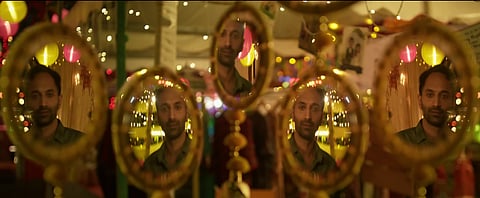

Follow TNM's WhatsApp channel for news updates and story links.
I wasn’t sure what to expect when I went in to watch Odum Kuthira Chaadum Kuthira. The reviews I’d seen online weren’t exactly encouraging. A few called it uneven, some others dismissed it altogether. Still, I went. And I’m glad I did, because as the credits rolled, I realised how profoundly it had moved me. It was funny, heartbreaking, and above all, recognisable.
Malayalam cinema has always had a way of surprising its audiences with bold experiments that balance entertainment and social commentary. When Althaf Salim announced his sophomore directorial starring Fahadh Faasil, expectations were understandably high. I watched the film with some trepidation, but what I found was not the film people had described.
What struck me most was its courage to stage depression not as a flat, tragic spectacle, but as something deeply absurd and strangely comic. The world isn’t shown in muted tones of grey but in bright colours and multiple flavours. At the heart of the film is Fahadh’s Aby, stumbling through a life that looks fine on the outside – friends, love, work – yet stuck in an internal loop that makes it all feel meaningless. And Fahadh, as usual, slips into the role with effortless precision; his sometimes empty, unreadable expressions suddenly giving way to bursts of joy, curiosity, or tender helpfulness.
There is a dream sequence where he is surrounded by lights, colours, festivities, and even mangoes, and yet he stands there, only a spectator. I don’t think I’ve ever seen a more accurate metaphor for what depression feels like. Everything you might like or want is there, everything should be fine, and still you are trapped in the loop which you can’t enjoy.
I kept thinking how depression, when you try to explain it to someone else, sounds almost silly. Your plant died. Your days feel the same. You can’t get out of bed and you cry. From the outside, none of this looks like ‘enough’ reason to be in pain. But on the inside, it is suffocating. The film captures that strange in-between space perfectly, allowing us to laugh at the absurdity, but never cruelly.
The scenes that touch on suicidality could easily have gone wrong. But here too, the film is remarkably sensitive. It never trivialises the weight of those feelings, but it also doesn’t drown them in melodrama.
One of the film’s biggest surprises for me was how it nudged me to view humour differently; not as an occasional treat to life but a lens through which we can see anything. I am not someone who usually looks at life through a comic lens. I laugh at jokes and make awful ones, and I certainly don’t associate humour with depression. Yet this film showed me that it is possible to laugh even in the darkest places, not as denial but as survival. Perhaps all of us need a Mathew — the quirky hilarious father with his own issues, played brilliantly by actor-director Lal — to talk us through life, making dad jokes, as we navigate its absurd loops.
One of the criticisms the film received was about the subplot with Aby’s neighbour Revathi, played by Revathi Pillai, who is coping with a loss of her own. I agree it could have been shorter, but the detour still made sense to me. Sometimes the only way to keep yourself afloat is by stepping into someone else’s problems. You throw yourself into helping them, or even exaggerating their troubles in your mind, just so you don’t drown on your own. It may not fix anything, but it can distract you long enough to survive.
Of course, the film isn’t perfect. At times the pacing drags, and some stretches risk losing momentum. My biggest reservation is the way the romance angle was treated. Friendship is beautifully shown as the force that helps Aby break free of his shell, but this gets overshadowed by an unconvincing love story, which seems to imply romance as the ultimate cure for depression. That feels reductive, especially for a film otherwise so nuanced.
Althaf Salim’s debut, Njandukalude Nattil Oridavela, looked at cancer through a lighter, more humorous lens, and it was widely loved for making a difficult subject feel accessible. I can’t help but wonder if part of that response was because cancer — or any physical illness — is easier to relate to. Depression isn’t. It’s stigmatised, invisible, hard to explain. Maybe that’s why Odum Kuthira Chaadum Kuthira has divided audiences. It isn’t always ‘relatable’.
But that, for me, is the film’s greatest strength. It reminds us that depression is not only tragic or serious — it can also be absurd, unpredictable, even funny. And sometimes, allowing ourselves to laugh at that absurdity is the most human response of all. Althaf Salim’s film achieves something rare: it makes us laugh at the absurdity of depression without ever making us feel mocked.
Views expressed are the author’s own.